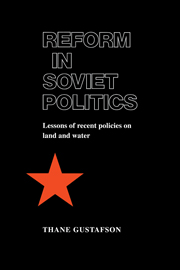Book contents
- Frontmatter
- Contents
- Preface
- Map of Soviet Russia showing major hydropower sites
- 1 Challenge of the third generation of Soviet power
- 2 Building authority around a new agricultural policy
- Part I Advice and dissent in the shaping of Brezhnev's agricultural and environmental programs
- 3 Environmental issues rise to official legitimacy
- 4 Displacing Stalinist dogma on the price of capital
- 5 Technology assessment Soviet style
- 6 Bringing new ideas into Soviet politics
- Part II Implementation of the Brezhnev programs
- Notes
- Index
3 - Environmental issues rise to official legitimacy
Published online by Cambridge University Press: 04 August 2010
- Frontmatter
- Contents
- Preface
- Map of Soviet Russia showing major hydropower sites
- 1 Challenge of the third generation of Soviet power
- 2 Building authority around a new agricultural policy
- Part I Advice and dissent in the shaping of Brezhnev's agricultural and environmental programs
- 3 Environmental issues rise to official legitimacy
- 4 Displacing Stalinist dogma on the price of capital
- 5 Technology assessment Soviet style
- 6 Bringing new ideas into Soviet politics
- Part II Implementation of the Brezhnev programs
- Notes
- Index
Summary
If agriculture was held in low regard prior to the late 1960s, environmental issues were hardly regarded at all. The successive public movements that tempered the effects of industrial and urban development in the West – sanitary engineering, conservation, and lately environmentalism – reached Russia as the feeble lapping of a remote wave. So completely did the goal of industrialization dominate all others that in the cities of southern USSR as recently as the mid-1960s and perhaps even later, even the provision of drinking water for the urban population was commonly neglected if it competed with industrial needs. Yet in little more than a decade, starting from near-total political exclusion, environmental issues have gained an established (if far from high-priority) place in the Soviet system of planning and policy making.
This dramatic rise to political respectability is linked to the Brezhnev agricultural policy in several ways. First, an environmental program expands the supply of clean water available for irrigated agriculture, and consequently it is an essential part of the southern strategy. Second, environmental reform, like agricultural reform, was prompted in the first instance by the need to respond to an impending crisis: crop failure in the case of agriculture and a serious decline in commercial freshwater fishing, combined with an outbreak of cholera at a key moment, in that of the environment. This “remedial” aspect shared by the two reforms is a sort of long-overdue final chapter to the first two generations of the Soviet period, for in both cases some action was necessary to counter the side effects of unbalanced industrialization.
- Type
- Chapter
- Information
- Reform in Soviet PoliticsThe Lessons of Recent Policies on Land and Water, pp. 39 - 52Publisher: Cambridge University PressPrint publication year: 1981



